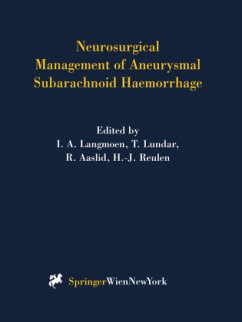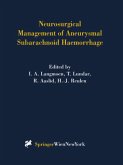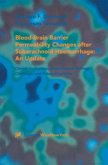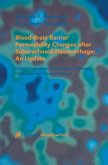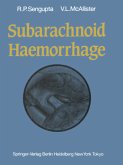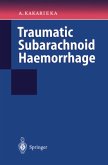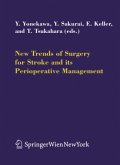The book presents state-of-the-art management of aneurysmal subarachnoid haemorrhage by a group of internationally highly recognized neurosurgeons. All aspects of neurosurgical diagnoses and treatment of aneurysmal subarachnoid haemorrhage are covered. There are separate chapters by world leading surgeons on transcranial doppler, treatment in intensive care unit, mechanisms, diagnoses and treatment of vasospasms, titanium aneurysm clips, surgical methods for treating aneurysms in the cavernous sinus, surgical methods for posterior circulation of aneurysms, surgical methods for anterior circulation aneurysms and methods for giant aneurysms, as well as long-term follow-up and neuropsychological consequences.
The small neck of the aneurysm afforded an easy surgical attack. An ordinary flat silver clip was placed over the sac and tightly compressed obliterated it completely. The clip was flush with the wall of the carotid artery. The sac, lateral to the silver clip, was then picked up with the forceps and thrombosed by the electocautery. Walter Dandy reporting his successful operation of a posterior communicating aneurysm on March 23, 1937. Walter Dandy's patient left the hospital in good health 2 weeks later, and from his report one may gain the impression that the operation was an easy task. Despite continuous developments during the following decades, it was not until the introduction of the operating microscope and microsurgical techniques that surgical treatment was generally accepted. During the microsurgical era surgical results have continued to improve due to diagnostical, neuroanaesthesi ological, and microsurgical refinements, and improved neurointensive care. Endovascular obliteration has become an important treatment alternative but this has not been included in this particular volume. The purpose of the present supplement of the ACTA NEUROCHIRURGICA is to review some of the elements in the neurosurgical management of patients with aneurysmal subarachnoid haemorrhage that are important for a successful outcome. Professor Helge Nornes has been a major force in the development of new techniques and research strategies in this area for a number of years and has recently retired from the National Hospital in Oslo.
The small neck of the aneurysm afforded an easy surgical attack. An ordinary flat silver clip was placed over the sac and tightly compressed obliterated it completely. The clip was flush with the wall of the carotid artery. The sac, lateral to the silver clip, was then picked up with the forceps and thrombosed by the electocautery. Walter Dandy reporting his successful operation of a posterior communicating aneurysm on March 23, 1937. Walter Dandy's patient left the hospital in good health 2 weeks later, and from his report one may gain the impression that the operation was an easy task. Despite continuous developments during the following decades, it was not until the introduction of the operating microscope and microsurgical techniques that surgical treatment was generally accepted. During the microsurgical era surgical results have continued to improve due to diagnostical, neuroanaesthesi ological, and microsurgical refinements, and improved neurointensive care. Endovascular obliteration has become an important treatment alternative but this has not been included in this particular volume. The purpose of the present supplement of the ACTA NEUROCHIRURGICA is to review some of the elements in the neurosurgical management of patients with aneurysmal subarachnoid haemorrhage that are important for a successful outcome. Professor Helge Nornes has been a major force in the development of new techniques and research strategies in this area for a number of years and has recently retired from the National Hospital in Oslo.
"This supplement to Acta Neurochirurgica ... is a slim but comprehensive, up-to-date, and excellent volume ... This is a well-made book, well worth its price, on high quality paper, with excellent radiographic images ... Neurosurgeons with a special interest in aneurysms as well as residents-in-training will find this book very useful, and it should be part of every library serving an academic neurosurgical program. The Canadian Journal of Neurological Sciences, 22. 3. 2000 "... this is an excellent book summarizing the actual pathophysiology, the neurosurgical treatment as well as the intensive care of patients with aneurysmal SAH ... This book should be on the shelf of all neurosurgeons and is certainly very helpful for intensivists dealing with this disease." Intensive Care Medicine, 1999/25

